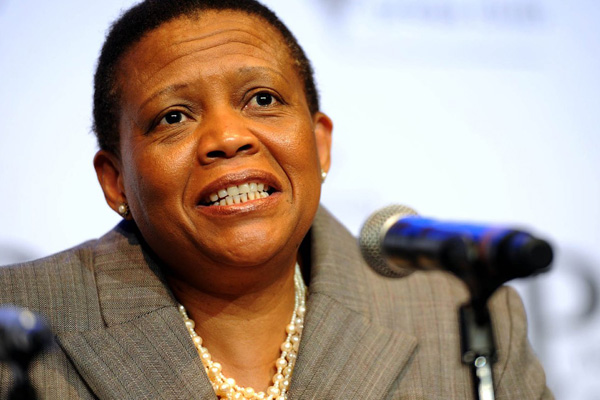The Special Rapporteur on Freedom of Expression and Access to Information in Africa, Commissioner Pansy Tlakula, undertook an advocacy visit to Mozambique, Ghana and the Southern African Development Community (SADC) secretariat in Gaborone, Botswana. The advocacy visits were undertaken to dicuss the implementation of the Model Law on Access to Information for Africa (Model Law).
Mozambique
On 26 June 2014, the Special Rapporteur on Freedom of Expression and Access to Information in Africa, Commissioner Pansy Tlakula, undertook an advocacy visit to Maputo, Mozambique. The purpose of the visit was to meet with government officials to advocate for the speedy adoption of the Mozambican Right to Information Bill, currently before Parliament, in accordance with regional and international standards on access to information as embodied in the Model Law on Access to Information for Africa (Model Law). The Special Rapporteur was accompanied during this visit by 3 expert members of the Working Group which developed the Model Law.
During her visit, the Special Rapporteur met with Mr Alfred Gamito, Chair of the Committee on public administration and social communication, which is the parliamentary committee responsible for the Right to Information Bill; Ms Benvinda Levy, Minister of Justice and Mr Ozias Pondja, President of the Supreme Court of Mozambique.
An important outcome of the Special Rapporteur’s visit was the acceptance of the technical assistance offered by the Special Rapporteur to Mozambique in the adoption of the Right to Information Bill, as well as for its future implementation. In this regard, the Special Rapporteur will amongst other things, be forwarding her comments on the current draft of the Right to Information Bill, ahead of plenary debate of the Bill in parliament, which is scheduled for 24 July 2014.
This advocacy visit is part of a three phased project funded by the United Nations Democracy Fund (UNDEF) being implemented by the Centre for Human Rights on behalf of the Special Rapporteur. The second phase of the project, which this visit falls under, involves advocacy visits by the Special Rapporteur to 5 selected African countries with Bills on access to information, to meet with high-level government officials and encourage the speedy adoption of an access to information law, which conforms to the Model Law.

Ghana
From 1-2 July 2014, the Special Rapporteur on Freedom of Expression and Access to Information in Africa, Commissioner Pansy Tlakula, undertook an advocacy visit to Accra, Ghana. The purpose of the visit was to meet with government officials to advocate for the speedy adoption of the Ghanaian Right to Information Bill, currently before Parliament, in accordance with regional and international standards on access to information as embodied in the Model Law on Access to Information for Africa (Model Law). The Special Rapporteur was accompanied during this visit by 4 expert members of the Working Group which developed the Model Law.
During her visit, the Special Rapporteur met with the leadership of Parliament which included the Speaker of parliament, Honourable Edward Ajaho as well as the majority and minority leaders; the chair and members of the select committee on constitutional legal and parliamentary affairs, which is the parliamentary committee responsible for the Right to Information Bill; Honourable Mahama Ayariga, Minister of Information and Media Relations and Ms Nana Oye Lithur, Minister for Gender, Children and Social Protection. In each of these meetings, the Special Rapporteur received assurances of Ghana’s commitment to the adoption of a Right to information law which takes into account the Model Law before the expiration of the tenure of the present government in 2016.
This advocacy visit is part of a three phased project funded by the United Nations Democracy Fund (UNDEF) being implemented by the Centre for Human Rights on behalf of the Special Rapporteur. The second phase of the project, which this visit falls under, involves advocacy visits by the Special Rapporteur to 5 selected African countries with Bills on access to information, to meet with high-level government officials and encourage the speedy adoption of an access to information law, which conforms to the Model Law.
Botswana
On 7 July 2014, the Special Rapporteur on Freedom of Expression and Access to Information in Africa, Commissioner Pansy Tlakula, undertook an advocacy visit to the Southern African Development Community (SADC) secretariat in Gaborone, Botswana. The purpose of the visit was to meet with the Executive Secretary, Dr Stergomenna Lawrence Tax, to discuss possible areas of collaboration on the ‘implementation’ of the Model Law. Specifically, the meeting sought to explore the possibility of the SADC secretariat adopting the Model Law as the sub-regional standard on access to information and through that, encourage member states to utilise the Model Law in the adoption or review of access to information legislation in the SADC region.
A major outcome of the discussions was the agreement to set up a technical committee comprising of relevant staff of the SADC secretariat and technical experts appointed by the Special Rapporteur, to develop in detail the adoption of the Model Law as the SADC standard on access to information, and work with Member States to adopt and review access to information laws which comply with the Model Law. The technical committee is also expected to develop and facilitate the implementation of Plan of Action on mainstreaming access to information into the day to day operations of the SADC secretariat.
This advocacy visit is part of a three phased project funded by the United Nations Democracy Fund (UNDEF) being implemented by the Centre for Human Rights on behalf of the Special Rapporteur. The first phase of the project, which this visit falls under, involves visits by the Special Rapporteur to key African Union organs such as the Africa Union Commission, Pan African Parliament, African Peer Review Mechanism as well as Regional Economic Communities-EAC, SADC and ECOWAS - to seek their collaboration in the ‘implementation’ of the Model Law.
